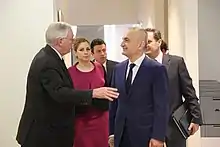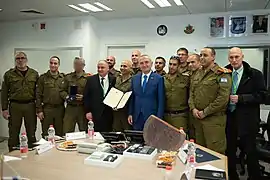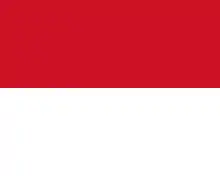Ilir Meta
Ilir Rexhep Meta (Albanian pronunciation: [iliɾ mɛta]; born 24 March 1969) is an Albanian political figure who is serving as President of Albania since 24 July 2017.[1] Previously he served as Prime Minister from 1999 to 2002, and at age 30 he is the second youngest prime minister in Albanian history after Zog I who was 27 at the time of his election in 1922. Meta also served as Minister of Foreign Affairs from 2002 to 2003 and again from 2009 to 2010. He was Chairman of the Parliament of Albania from 2013 to 2017.[2] Meta also held positions as Deputy Prime Minister and Minister of Economy, Trade, and Energy. Prior to that, he held the Chairmanship of the Parliamentary Commission of European Integration. Meta founded the Socialist Movement for Integration (LSI) in 2004.
Ilir Meta | |
|---|---|
.jpg.webp) Ilir Meta in December 2013. | |
| President of Albania | |
| Assumed office 24 July 2017 | |
| Prime Minister | Edi Rama |
| Preceded by | Bujar Nishani |
| 31st Prime Minister of Albania | |
| In office 29 October 1999 – 29 January 2002 | |
| President | Rexhep Meidani |
| Preceded by | Pandeli Majko |
| Succeeded by | Pandeli Majko |
| 41st Speaker of Parliament | |
| In office 10 September 2013 – 24 July 2017 | |
| Preceded by | Jozefina Topalli |
| Succeeded by | Valentina Leskaj (Acting) |
| 47th Minister of Foreign Affairs | |
| In office 17 September 2009 – 17 September 2010 | |
| Prime Minister | Sali Berisha |
| Preceded by | Lulzim Basha |
| Succeeded by | Edmond Haxhinasto |
| In office 31 July 2002 – 18 July 2003 | |
| Prime Minister | Fatos Nano |
| Preceded by | Arta Dade |
| Succeeded by | Luan Hajdaraga (Acting) |
| Personal details | |
| Born | 24 March 1969 Çorovodë, Skrapar, Albania |
| Political party | Independent (2017–present) |
| Other political affiliations | Socialist Party (1990–2004) Socialist Movement for Integration (2004–2017) |
| Spouse(s) | |
| Children | 3 |
| Signature | .svg.png.webp) |
On 28 April 2017, he was elected as President of Albania, receiving 87 votes from the 140 Members of Parliament.[3]
He is an ardent supporter of Celtic FC, often showing his passion for the club on social media. In July 2020, he founded the first ever Celtic Supporter's Club in Albania.[4]
Early life and education
Ilir Meta was born on 24 March 1969 in Çorovodë, Skrapar. He graduated at the Faculty of Economy and Politics branch of the University of Tirana, where he also pursued his post-graduate studies. He is fluent in Albanian, English, and Italian.
Meta is a Bektashi, and declares his adherence to traditional Bektashian values.[5] Meta has been married to Monika Kryemadhi since October 1998.[6] They have two daughters and a son, Bora, Era & Besar.
Political career
Meta has been engaged in politics since 1990 after the fall of communism in Albania as an active participant in the students' movement against communism, which brought political pluralism in Albania. Since 1992 he has been elected Member of Parliament in all legislatures and has been an active member of several Parliamentary Commissions. From 1996 to 1997 he was Deputy Chairman of the Foreign Affairs Commission of Parliament. From October 1998 to October 1999, Ilir Meta was Deputy Prime Minister and Minister of Coordination, as well as State Secretary for European Integration in the Ministry of Foreign Affairs in March–October 1998.
In 2004, Meta left the Socialist Party of Albania (PS) and founded his own party, the Socialist Movement for Integration (LSI). From 2004 to 2006, Meta was nominated as a member of the International Commission on the Balkans, chaired by the former Prime Minister of Italy, Giuliano Amato. The Commission drafted a series of important recommendations towards the integration of the Western Balkan countries into the European Union.[7]
In 2010, a video of Ilir Meta discussing corruptive affairs worth 800,000 euros with late politician Dritan Prifti emerged in the Albanian media after the latter had purposely tapped their conversation. This forced him to resign as deputy Prime Minister of Albania, even though he claimed innocence.[8]
1999–2002
Meta became Prime Minister on 29 October 1999. He was the youngest person to serve as Albanian Prime Minister. Following the 2001 parliamentary election, he initially remained Prime Minister. The President of Albania, Rexhep Meidani, approved the Government of Albania on 7 September 2001. Five days afterward, the government gave a vote of confidence to Meta's Cabinet. However, the formation of the new cabinet took almost three months.[9] On 29 January 2002, Meta announced his resignation as Prime Minister due to party infighting between the Socialist Party leader Fatos Nano and himself. Pandeli Majko was elected as Prime Minister on 22 February 2002.
During this period, Albania engaged in a range of important reforms, joining the Stabilization and Association Process with the European Union.
2009–2017
In the 2009 parliamentary election, the Socialist Movement for Integration (LSI) won four seats in the Parliament of Albania, with 4.8% of the total vote. The party along with PSV91 became the determining parties to form the government coalition.[10] On 16 September 2009, the LSI allied with the Democratic Party of Albania (PD) to form the government coalition.[11]
With the formation of the new government led by Democratic Party chairman Sali Berisha, Meta became the Deputy Prime Minister and the Minister of Foreign Affairs at the same time.[12] He was an early and vocal campaigner for the visa-free with the Schengen Area, which was accomplished in 2010. He remains one of the most vocal campaigners and advocates of regional and European integration for all countries of the Western Balkans, as a means to further strengthen stability and peace in the region.
In 2011, Meta served as the Minister of Economy, Trade, and Energy in the center-right government of Sali Berisha, whose Democratic Party of Albania, the LSI joined after the 2009 parliamentary election.
In the run-up to the eighth multi-party elections held in 2013, Meta and the Socialist Movement for Integration (LSI) left the coalition with the Democratic Party (PD) established in 2009, to transfer over to the Socialist Party (PS). The result of the elections was a victory for the Alliance for a European Albania containing with LSI led by the PS and its leader, Edi Rama.[13] On 10 September 2013, Parliament elected Meta as Chairman of Parliament by a vote of 91 to 45.
Presidency


On 28 April 2017, Meta was elected President of the Republic of Albania at the fourth ballot with 87 votes out of 140. He took office on 24 July 2017. In the ceremony, he was accompanied solely by his children, as his wife Monika Kryemadhi refused the First Lady position because of her political engagement as leader of the party her husband founded, while their daughter, Era Meta being as the First Lady of Albania.
As his predecessor, during his term of office, the main focus is the European integration process of the country and global challenges affecting Albania. He underlined the willingness of Albanians to strengthen the bilateral strategic partnership with all partner countries in the area of security and NATO.[14]
Awards
In March 2012, Meta received "Most Positive Personality for 2010 in Foreign Policy" award by International Institute "IFIMES" in Ljubljana, Slovenia. The award was presented to Meta by former President of Croatia, Stjepan Mesic, which was at the same time the Honorary President of IFIMES.
Meta was praised as the most positive political personality for 2010, when he served as Deputy Prime Minister and Foreign Minister for his positive and concrete contribution in exercising the foreign policy of Albania and for his personal and institutional influence in strengthening good regional and neighborly relations amongst the countries of the Balkans. The institute praised Meta's vision at the head of Albanian diplomacy as a political personality with a regional weight and with a clear purpose to create a more open, positive and integrated region.
Honours
Foreign honours
 Croatia:
Croatia:
 Grand Cross of the Grand Order of King Tomislav (29 October 2019)
Grand Cross of the Grand Order of King Tomislav (29 October 2019)
 Monaco:
Monaco:
 Grand Cross of the Order of Saint-Charles (16 October 2019)
Grand Cross of the Order of Saint-Charles (16 October 2019)
References
- "Ilir Meta zgjidhet president i Shqipërisë". rtsh.al (in Albanian). 28 April 2017.
- parlament.al Speaker of the Parliament of the Republic of Albania
- "Ilir Meta, president i ri i Shqipërisë" (in Albanian). 28 April 2017.
- "'Praise God, today one year ago, I met Celtic fans in Sarajevo,' Albanian President, Ilir Meta". The Celtic Star.
- "FOTO/ Familja Meta, feston me entuziazëm festën e Bektashinjve". standard.al (in Albanian). 23 March 2017.
- "Martesa sekrete e Ilir Metës dhe Monika Kryemadhit". revistawho.com (in Albanian). 17 May 2017.
- Archived 8 October 2017 at the Wayback Machine International Commission on the Balkans
- "Albanian deputy PM resigns". www.euractiv.com.
- "Balkan Report: September 18, 2001". rferl.org. 18 September 2001.
- "Election campaign with the taste of blood". International Institute for Middle-East and Balkan Studies. 24 June 2009. Retrieved 6 September 2012.
- Marc Stegherr; Kerstin Liesem (13 August 2010). Die Medien in Osteuropa: Mediensysteme Im Transformationsprozess. Springer-Verlag. p. 159. ISBN 978-3-531-92487-8.
- "Qeveria e dytë e Sali Berishës (16 shtator 2009 – 10 shtator 2013)". shtetiweb.org (in Albanian).
- "Sieg der Sozialisten". taz.de (in German). 25 June 2013.
- http://balkaneu.com/president-meta-to-trump-us-presence-is-a-key-factor-for-the-stability-of-the-region/
External links
| Wikimedia Commons has media related to Ilir Meta. |
| Political offices | ||
|---|---|---|
| Preceded by Pandeli Majko |
Prime Minister of Albania 1999–2002 |
Succeeded by Pandeli Majko |
| Preceded by Arta Dade |
Minister of Foreign Affairs 2002–2003 |
Succeeded by Luan Hajdaraga Acting |
| Preceded by Lulzim Basha |
Minister of Foreign Affairs 2009–2010 |
Succeeded by Edmond Haxhinasto |
| Preceded by Jozefina Topalli |
Speaker of Parliament 2013–2017 |
Succeeded by Valentina Leskaj Acting |
| Preceded by Bujar Nishani |
President of Albania 2017–present |
Incumbent |